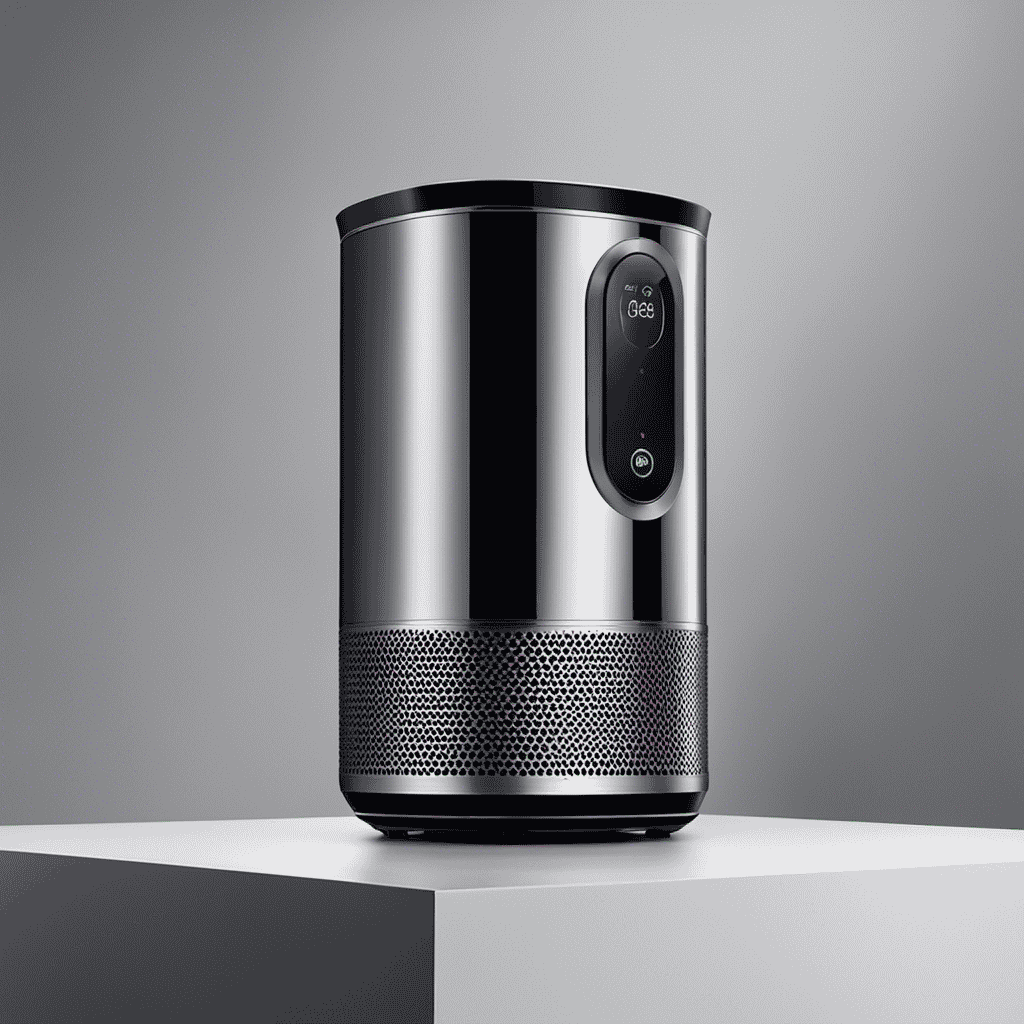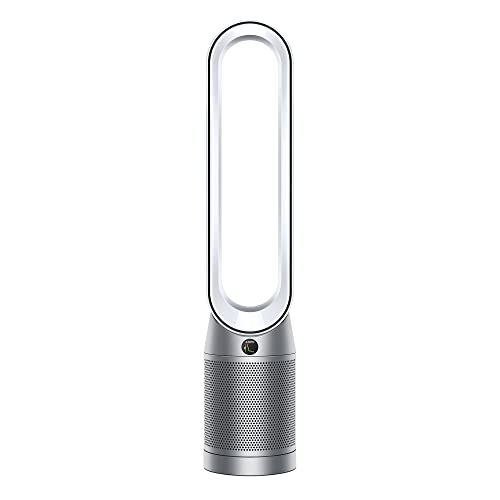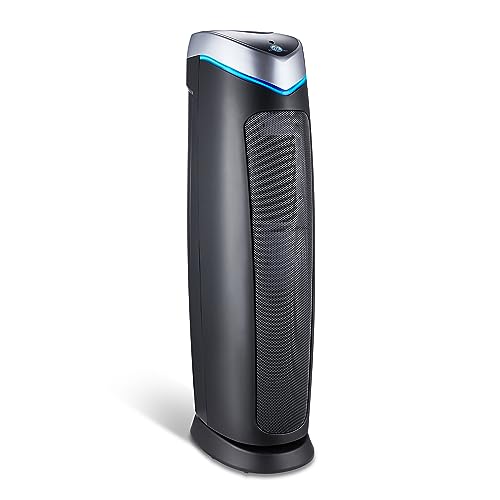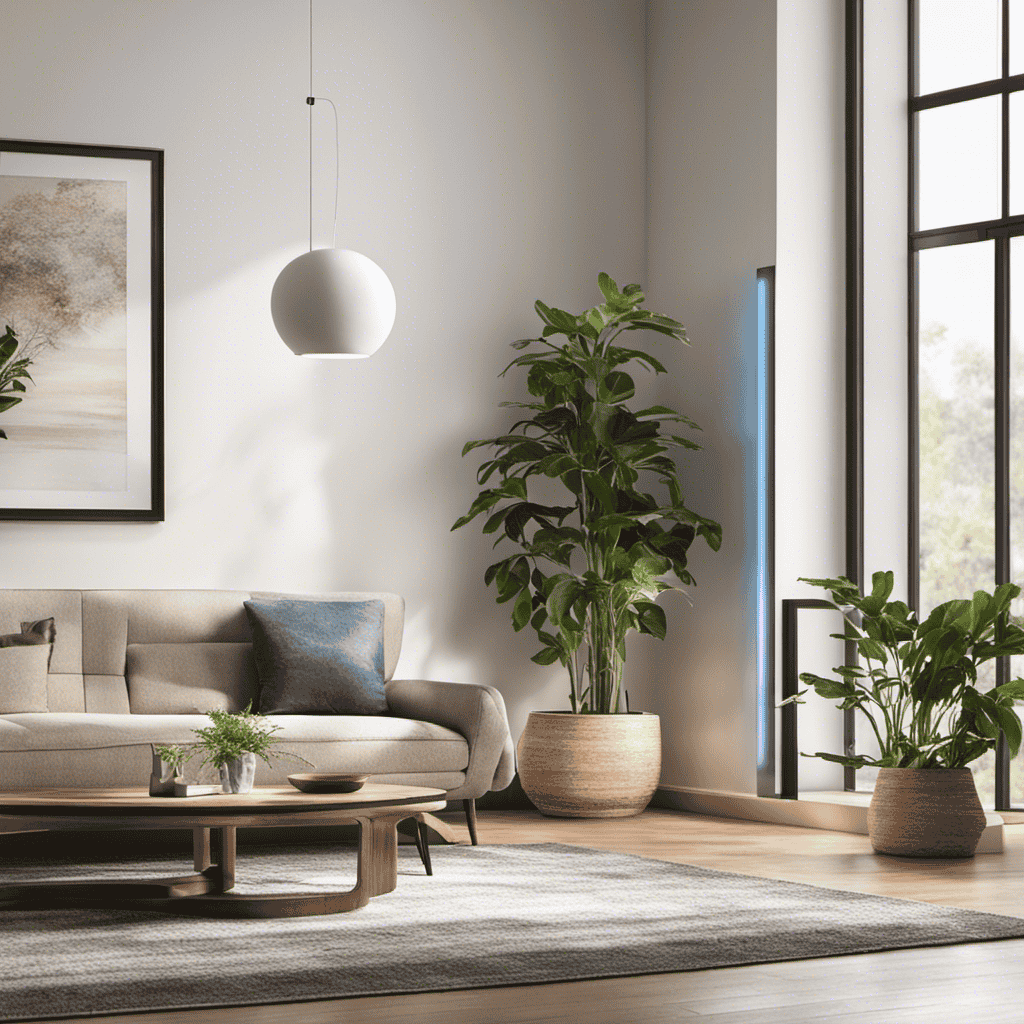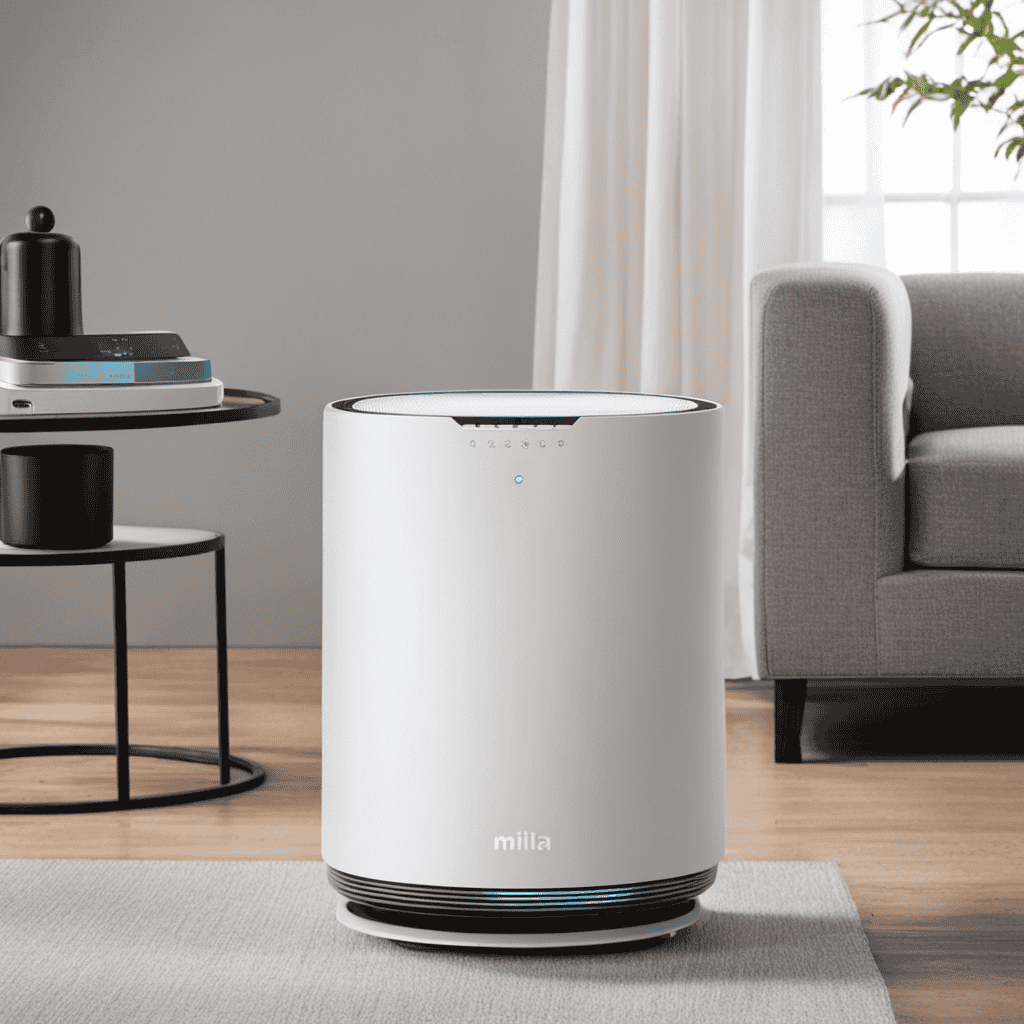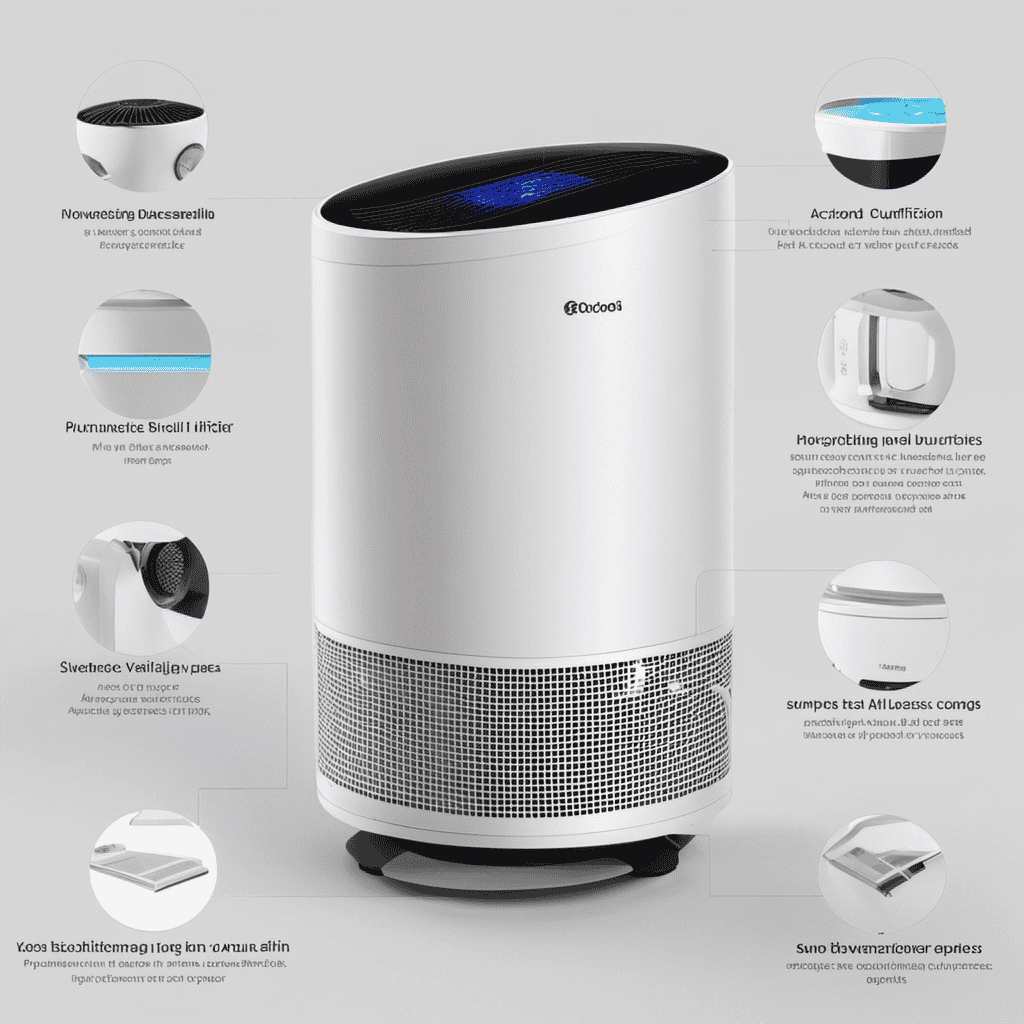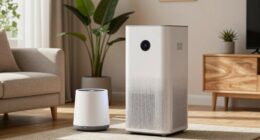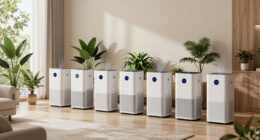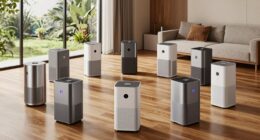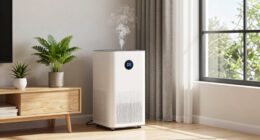As an enthusiastic champion for air purity and someone who prides themselves on being a connoisseur of air purifiers, I have dedicated numerous hours to investigating the top choices available in the industry.
In this article, I aim to provide an unbiased and detailed comparison between two popular air purifiers: the Dyson and the Germinator.
From features and specifications to performance and design, I will delve into every aspect that matters.
So, buckle up and join me on this journey to discover which of these air purifiers reigns supreme.
Key Takeaways
- Dyson air purifier has a remote control, while Germinator does not have one.
- Dyson operates quietly and efficiently, whereas Germinator may produce a slightly higher noise level.
- Dyson is energy-efficient and can result in cost savings on electricity bills, while Germinator may consume more power.
- Both Dyson and Germinator have high-quality filters and effectively capture and remove airborne pollutants, allergens, and odors.
Features and Specifications
The Dyson air purifier has a remote control, whereas the Germinator does not.
When it comes to noise level and sound quality, the Dyson air purifier operates quietly and efficiently. It uses advanced technology to minimize noise, ensuring a peaceful environment for users. On the other hand, the Germinator may produce a slightly higher noise level, which could be a concern for some individuals.
In terms of energy efficiency and power consumption, the Dyson air purifier is designed to be energy-efficient, using less power while still maintaining effective purification. This can result in cost savings on electricity bills. The Germinator, on the other hand, may consume more power compared to the Dyson model.
It is important to consider these factors when choosing an air purifier that best suits your needs.
Performance and Air Filtration
For the best performance and air filtration, you should consider factors like effectiveness and filter quality when comparing Dyson and Germinator. Both air purifiers have their own unique features and advantages.
Here are three important points to consider when evaluating their performance and air filtration capabilities:
-
Noise level and quiet operation: Both Dyson and Germinator are designed to operate quietly, ensuring a peaceful environment while the purifier is running.
-
Energy efficiency and power consumption: Dyson and Germinator are known for their energy-efficient operation, helping you save on electricity bills without compromising on air purification.
-
Filter quality and effectiveness: Both air purifiers are equipped with high-quality filters that effectively capture and remove airborne pollutants, allergens, and odors.
When comparing Dyson and Germinator, it’s crucial to assess these factors to ensure you choose the air purifier that best suits your needs for performance and air filtration.
Design and Aesthetics
When comparing Dyson and Germinator, it’s important to consider their design and aesthetics to find the air purifier that suits your style.
Both brands offer sleek and modern designs that can easily blend into any decor. Dyson air purifiers are known for their innovative and futuristic look, with their signature bladeless design. On the other hand, Germinator offers a more traditional and compact design.
In terms of noise levels, Dyson air purifiers are generally quieter compared to Germinator models. This can be an important factor, especially if you plan on using the air purifier in a bedroom or office space. Additionally, Dyson air purifiers are known for their energy-efficient operation, which can help lower your energy consumption.
Transitioning into the next section about user-friendly interface and controls, both Dyson and Germinator offer intuitive and easy-to-use controls, making it simple to adjust settings and monitor air quality.
User-Friendly Interface and Controls
Considering their user-friendly interface and controls, both Dyson and Germinator make it easy to adjust settings and monitor air quality. When comparing the two air purifiers, several factors come into play, including energy efficiency and noise levels.
Here are some key points to consider:
-
Energy Efficiency: Both Dyson and Germinator are designed to be energy-efficient. They utilize advanced technology to minimize power consumption while still providing effective air purification.
-
Noise Levels: One important aspect to consider is the noise levels produced by the air purifiers. Dyson and Germinator strive to keep noise to a minimum, ensuring a quiet and peaceful environment for users.
-
Ease of Use: Both Dyson and Germinator offer intuitive controls and straightforward settings, making them easy to operate for users of all ages and technological expertise.
Cost and Value for Money
To get the most value for your money, you’ll want to compare the cost of both options and consider what features are most important to you. When comparing the Dyson air purifier and the Germinator, it’s essential to take into account not just the initial cost but also the long-term maintenance expenses. While the Dyson air purifier may have a higher upfront cost, it boasts advanced filtration technology that can effectively capture pollutants and allergens. On the other hand, the Germinator may have a lower initial cost but could require more frequent filter replacements, leading to higher long-term maintenance costs. To help you make an informed decision, here is a cost comparison table of the Dyson and Germinator air purifiers:
| Air Purifier | Initial Cost | Long-term Maintenance |
|---|---|---|
| Dyson | $500 | $50 (annual filter replacement) |
| Germinator | $300 | $75 (bi-annual filter replacement) |
Considering the cost comparison and long-term maintenance, it’s important to weigh these factors against the features and performance of each air purifier to determine which option offers the best value for your money.
Frequently Asked Questions
How Long Does the Filter Last in Both the Dyson and Germinator Air Purifiers?
In both the Dyson and Germinator air purifiers, the filter should be replaced regularly. The frequency of replacement depends on factors like usage and air quality. Additionally, the price difference between the two purifiers should be considered.
Can the Dyson or Germinator Air Purifiers Be Controlled Remotely Through a Smartphone App?
Controlling air purifiers through smartphone apps has its pros and cons. It offers convenience and flexibility, but some may find it unnecessary. When comparing energy efficiency, it’s important to consider both Dyson and Germinator models.
Do Both the Dyson and Germinator Air Purifiers Have a Sleep Mode for Quiet Operation at Night?
Yes, both the Dyson and Germinator air purifiers have a sleep mode for quiet operation at night. They are designed to reduce noise levels and provide a peaceful sleeping environment.
Are There Any Additional Features or Technologies That Set the Dyson and Germinator Air Purifiers Apart From Their Competitors?
Both the Dyson and Germinator air purifiers offer additional features and technologies that set them apart from their competitors. These features include HEPA filters, smart sensors, and advanced purification systems for optimal air quality.
Can the Dyson or Germinator Air Purifiers Effectively Remove Odors and Volatile Organic Compounds (Vocs) From the Air?
Yes, both the Dyson and Germinator air purifiers effectively remove odors and volatile organic compounds (VOCs) from the air. They are comparable in their effectiveness and provide good value for money.
Conclusion
After thorough research and analysis of the features, performance, design, user-friendliness, and cost, it is difficult to definitively declare whether the Dyson or Germinator air purifier is better.
Both models have their own unique strengths and weaknesses, making it a matter of personal preference and specific needs.
While the Dyson offers advanced technology and sleek design, the Germinator excels in air filtration and affordability.
Ultimately, the choice between these two reputable brands depends on individual priorities and requirements.
Which factors matter most to you in an air purifier?

